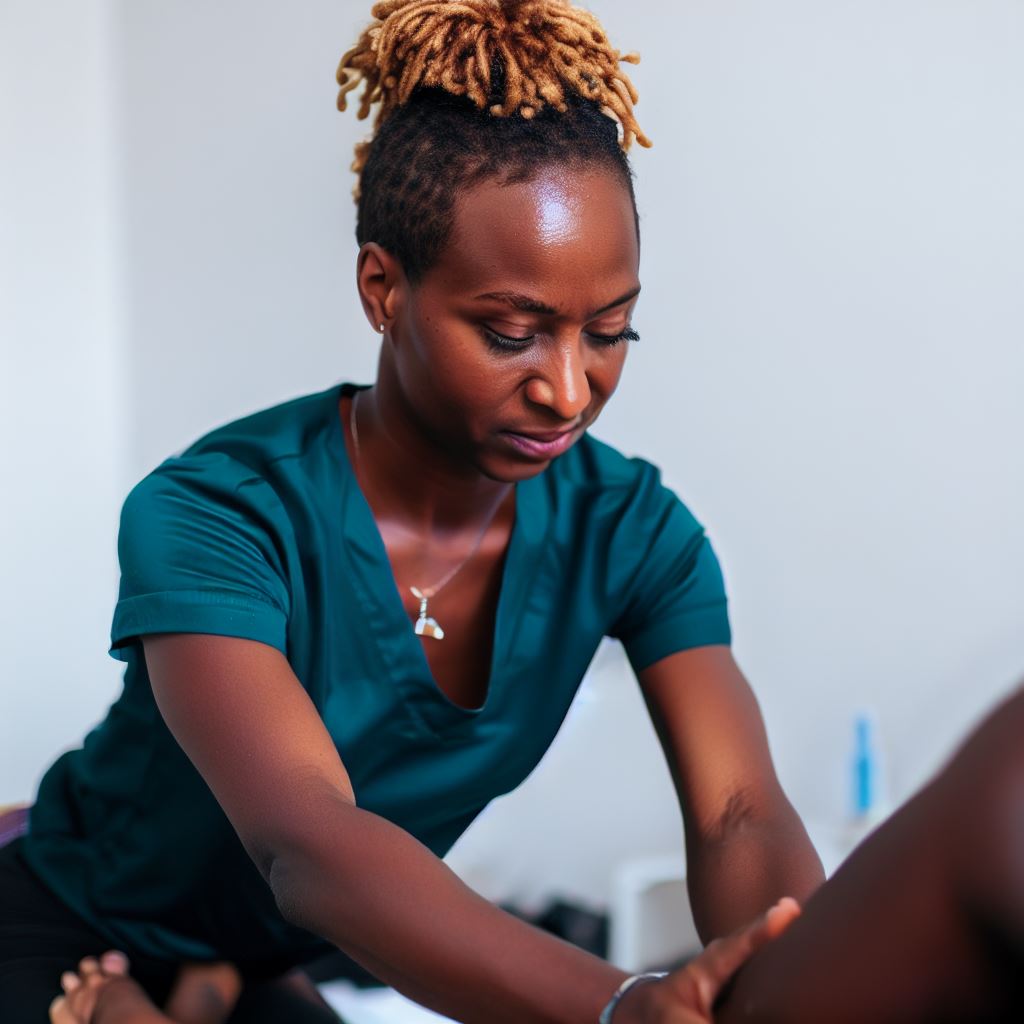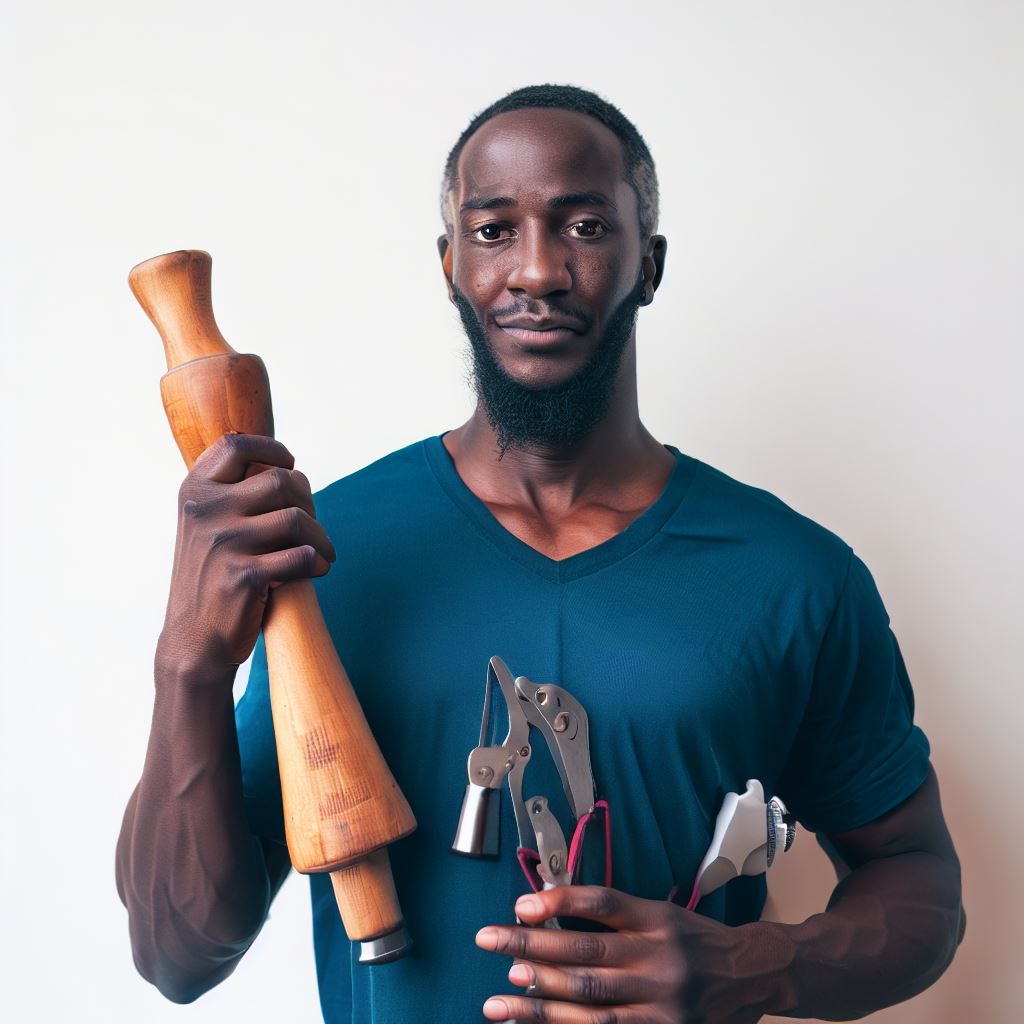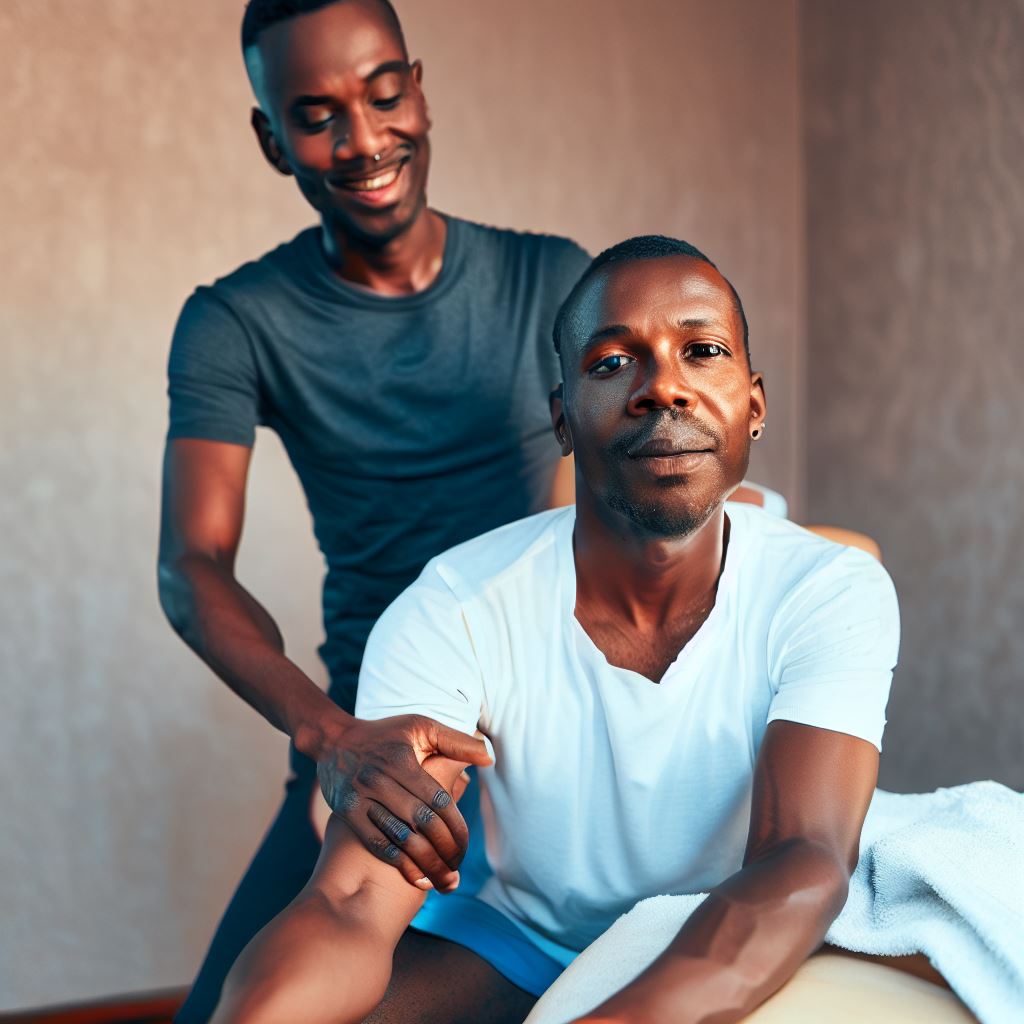Introduction
A. Sports Massage Therapy: Unlocking Peak Performance
The role of a Sports Massage Therapist in Nigeria is increasingly gaining significant recognition within the country’s sports landscape.
It focuses on applying specialized techniques to athletes, enhancing their physical condition, and optimizing their performance.
B. The Vital Significance in Nigerian Sports
In Nigeria, sports have transcended mere recreation; they’ve become an integral part of our national identity.
Whether it’s football, athletics, or boxing, our athletes strive for excellence on the global stage.
Yet, this journey is filled with physical challenges, from muscle strains to joint stiffness.
This is where sports massage therapy steps in.
Sports massage therapy plays a pivotal role in ensuring our athletes’ well-being and readiness.
Nigeria’s athletes endure intense training regimes and competitions, which take a toll on their bodies.
Sports massage therapy aids in the recovery process, alleviating muscle soreness and preventing injuries.
Moreover, this therapy enhances athletes’ flexibility and range of motion, enabling them to perform at their best.
In a nation where sports are not just a game but a source of pride, every edge counts.
In this blog series, we’ll delve deep into the world of sports massage therapy in Nigeria.
We’ll explore its techniques, benefits, and its indispensable role in nurturing our sporting heroes.
Join us on this journey to uncover the secrets behind the success of Nigerian athletes and the hands that make it possible – our dedicated sports massage therapists.
Role of a Sports Massage Therapist
A. Definition and qualifications of a sports massage therapist
A sports massage therapist is a professional who specializes in using massage techniques to help athletes prevent and recover from injuries, enhance performance, and maintain overall physical wellbeing.
To become a sports massage therapist in Nigeria, individuals must complete a relevant training program or obtain a degree in sports therapy.
They should also obtain certifications from recognized sports massage therapy organizations to ensure credibility and professionalism.
B. Skills and techniques required for the role
Aside from having a solid understanding of anatomy and physiology, sports massage therapists need excellent communication and interpersonal skills.
They should be able to assess an athlete’s condition and develop personalized treatment plans accordingly.
Skills required include deep tissue massage, myofascial release, joint mobilization, and stretching techniques.
Additionally, therapists must know how to use special tools like foam rollers, massage balls, and therapy bands to assist in their treatments.
C. Understanding the limits of their practice
Sports massage therapists must be aware of their professional boundaries and not diagnose or treat medical conditions beyond their expertise.
If they encounter a condition outside their scope, they should refer the athlete to an appropriate healthcare professional.
They should also maintain up-to-date knowledge of contraindications and precautions related to sports massage to ensure athlete safety.
Furthermore, therapists need to establish open communication with athletes, understanding their comfort levels and adjusting the treatment accordingly.
Basically, a sports massage therapist in Nigeria plays a crucial role in the athletic community’s overall wellbeing and performance.
They are qualified professionals who have undergone specific training and obtained necessary certifications.
With their skills and techniques, they provide specialized massages to athletes, helping them prevent injuries, recover faster, and maintain optimal physical condition.
However, it is vital for therapists to understand the limits of their practice and not overstep into medical diagnosis or treatment.
By maintaining professional boundaries, sports massage therapists serve as important members of an athlete’s support team, enhancing their sporting experience and promoting their physical health.
Read: Top Clinics for Sports Massage Therapy Treatment in Nigeria
Benefits of Sports Massage Therapy
A sports massage therapist plays a critical role in the overall well-being and performance of athletes in Nigeria.
This specialized form of massage therapy offers numerous benefits that go beyond relaxation and stress relief.
Let’s explore some of the key advantages of sports massage therapy:
A. Enhancement of Athletic Performance
Sports massage therapy can significantly improve an athlete’s performance by increasing blood circulation, promoting better oxygen supply, and enhancing nutrient delivery to the muscles.
This enables athletes to perform at their best and achieve optimal results.
B. Prevention and Management of Injuries
Sports massage therapists are trained to identify potential areas of injury and provide preventive measures to avoid them.
Regular sessions can help identify and address muscle imbalances, tightness, and weaknesses, reducing the risk of sports-related injuries.
C. Reduction of Muscle Soreness and Stiffness
Intense physical activity can lead to muscle soreness and stiffness.
Sports massage therapy effectively reduces these symptoms by increasing blood flow to the muscles, helping to flush out metabolic waste and toxins that contribute to muscle fatigue.
D. Improvement in Flexibility and Range of Motion
Sports massage therapy incorporates stretching techniques that promote flexibility and increase range of motion.
By loosening tight muscles and improving joint mobility, athletes can experience improved performance and reduced risk of muscle strains or joint injuries.
Generally, sports massage therapy offers a range of benefits that go beyond relaxation.
It enhances athletic performance, prevents and manages injuries, reduces muscle soreness and stiffness, and improves flexibility and range of motion.
Athletes in Nigeria can greatly benefit from incorporating sports massage therapy into their training regimen.
Read: Cultural Aspects of Sports Massage Therapy in Nigeria
Sports Massage Therapy Techniques
Sports massage therapists in Nigeria are trained in various techniques to address athletes’ specific needs.
A. Deep tissue massage
The deep tissue massage technique used by sports massage therapists in Nigeria focuses on releasing tension, knots, and adhesions in the deeper muscle layers.
This technique involves applying firm pressure and slow strokes to reach the targeted muscles.
B. Swedish massage
Swedish massage, on the other hand, is a popular technique used by sports massage therapists in Nigeria to promote general relaxation and improve blood circulation.
The therapist uses long, gliding strokes, kneading, and circular motions to help reduce muscle tension and promote overall well-being.
C. Myofascial release
Myofascial release is another technique employed by sports massage therapists in Nigeria.
It targets the fascia, a connective tissue that surrounds muscles, to release tension and restore mobility.
This technique involves applying sustained pressure to the affected areas or using gentle stretching techniques.
D. Trigger point therapy
Trigger point therapy is also commonly used by sports massage therapists in Nigeria.
This technique involves applying focused pressure to specific points in the muscles, known as trigger points, to relieve pain and release muscle knots.
It helps in reducing pain and promoting better muscle function.
E. Stretching and proprioceptive neuromuscular facilitation (PNF)
In addition to these techniques, sports massage therapists in Nigeria also incorporate stretching and proprioceptive neuromuscular facilitation (PNF) into their practice.
These techniques involve a combination of passive and active stretching to improve flexibility, enhance performance, and prevent injuries.
The therapist may guide the athlete through various stretching exercises or use resistance techniques to activate specific muscle groups.
Overall, sports massage therapists in Nigeria have a wide range of techniques at their disposal to meet the specific needs of athletes.
From deep tissue massage to Swedish massage, myofascial release, trigger point therapy, and stretching techniques, these therapists play a crucial role in enhancing athletic performance, preventing injuries, and promoting overall well-being.
Read: A Day in the Life of a Nigerian Sports Massage Therapist

Sports Massage Therapy Process in Nigeria
A. Initial consultation and assessment
- The sports massage therapy process in Nigeria begins with an initial consultation and assessment.
- During this phase, the massage therapist meets with the client to gather relevant information.
- The therapist evaluates the client’s medical history, current condition, and specific needs.
- The assessment may include physical tests and observations to determine the appropriate treatment approach.
- This step ensures that the therapist understands the client’s goals and any potential limitations.
- Through open communication, the therapist establishes trust and creates a comfortable environment.
- The initial consultation and assessment form the foundation for the tailored treatment plan.
B. Development of tailored treatment plan
- After the assessment, the sports massage therapist develops a personalized treatment plan for the client.
- The plan takes into account the client’s individual goals, preferences, and specific muscular or soft tissue concerns.
- The therapist considers the type and intensity of physical activities the client engages in.
- Using their expertise, the therapist determines the most effective techniques and modalities to address the client’s needs.
- The tailored treatment plan is designed to enhance performance, prevent injuries, and promote overall well-being.
- This stage may also involve educating the client about self-care practices and injury prevention strategies.
- The development of a tailored treatment plan ensures that the therapy aligns with the client’s unique requirements.
C. Execution of the treatment plan
- Once the treatment plan is established, the sports massage therapist begins the actual therapy sessions.
- The therapist applies various massage techniques and manipulations tailored to the client’s needs.
- They may use deep tissue massage, Swedish massage, stretching, or other specialized techniques.
- During the sessions, the therapist focuses on improving blood circulation, reducing muscle tension, and relieving pain.
- They pay particular attention to areas of the body that are commonly stressed or prone to injury in the client’s sport or activity.
- The therapist adjusts the pressure and techniques based on the client’s feedback and comfort level.
- The execution of the treatment plan involves regular sessions, usually scheduled according to the client’s training or competition schedule.
D. Monitoring progress and making adjustments as needed
- Throughout the sports massage therapy process, the therapist closely monitors the client’s progress.
- They assess changes in the client’s performance, range of motion, and any pain or discomfort reduction.
- The therapist communicates with the client to gather feedback and make necessary adjustments to the treatment plan.
- Adjustments may include modifying the frequency of sessions, focusing on specific muscle groups, or incorporating new techniques.
- Regular progress assessments ensure that the therapy remains effective and meets the client’s evolving needs.
- The therapist strives to optimize the client’s performance, prevent injuries, and support their overall well-being.
- By monitoring progress and making adjustments as needed, the sports massage therapist maximizes the benefits of therapy in Nigeria.
Read: Sports Massage Therapy as a Female Profession in Nigeria
Legal and Ethical Considerations
A. Certification and regulation of sports massage therapists in Nigeria
- Obtaining a proper certification is essential for sports massage therapists in Nigeria.
- The Nigerian Massage Therapy Board sets the standards for certification and regulates the profession.
- These regulations ensure that therapists have the necessary skills and qualifications to provide sports massage.
- Having a certified therapist gives clients the assurance that they are receiving high-quality care.
- Compliance with certification requirements also helps to maintain the integrity and professionalism of the profession.
B. Importance of maintaining client confidentiality
- Client confidentiality is a crucial ethical consideration for sports massage therapists in Nigeria.
- Therapists must respect and protect the privacy of their clients at all times.
- Sharing any personal or medical information without consent is a breach of client confidentiality.
- Protecting client confidentiality helps to build trust and establish a strong therapist-client relationship.
- Therapists should ensure that client records and information are stored securely and only accessed by authorized personnel.
C. Ensuring a safe and comfortable environment for clients
- Sports massage therapists in Nigeria have a responsibility to provide a safe and comfortable environment for their clients.
- Therapists should ensure that their treatment rooms are clean, hygienic, and well-maintained.
- Proper sanitation practices should be followed, including using clean towels and equipment for each client.
- Therapists should create a welcoming and relaxing atmosphere to help clients feel at ease during their sessions.
- Being attentive to clients’ comfort levels and addressing any concerns promptly is essential.
Challenges and Future Perspectives
A. Limited Awareness and Acceptance of Sports Massage Therapy in Nigeria
- In Nigeria, sports massage therapy faces a significant challenge: limited awareness and acceptance.
- Many individuals still view massage as a luxury rather than a vital aspect of sports performance.
- The misconception that massage is only for relaxation prevails, hindering its integration into sports culture.
- Sports massage therapists often struggle to educate both athletes and the general public about its true benefits.
B. Potential Growth and Opportunities in the Field
- Despite the challenges, there’s immense potential for growth in the sports massage therapy field in Nigeria.
- As more athletes and sports organizations recognize its value, demand is expected to surge.
- Sports events, from local tournaments to international competitions, offer opportunities for therapists to showcase their skills.
- Collaborations with sports medicine professionals can open doors for therapists to become integral members of sports teams.
C. Importance of Continuous Professional Development and Education
- To meet evolving demands, sports massage therapists must prioritize continuous professional development.
- Staying updated on the latest techniques and research is crucial for providing top-tier care.
- Engaging in workshops, conferences, and certifications enhances therapists’ credibility and knowledge base.
- Networking with other professionals in the sports and healthcare industry fosters growth and opportunities.
Essentially, while sports massage therapy faces challenges in Nigeria due to limited awareness and acceptance, the field holds vast potential for growth.
Continuous professional development and education are essential for therapists to thrive in this evolving landscape.
As awareness spreads and athletes experience the benefits firsthand, the future of sports massage therapy in Nigeria looks promising.
Conclusion
A sports massage therapist plays a vital role in the field of sports and athletic performance in Nigeria.
They provide numerous benefits to athletes, helping them recover from injuries, reduce muscle pain and tension, enhance flexibility, and improve overall performance.
For individuals considering a career path in healthcare, sports massage therapy offers a rewarding option.
It allows professionals to work closely with athletes and contribute to their wellbeing.
Athletes, on the other hand, should not hesitate to seek sports massage therapy for their treatment.
It can help them prevent injuries, improve their range of motion, and accelerate their recovery process after intense physical activities.
The impact of sports massage therapy on sports performance and overall wellbeing in Nigeria should not be underestimated.
It has the potential to significantly improve the performance of athletes and enhance their overall health and quality of life.
A strong emphasis should be placed on education and awareness to promote the benefits of sports massage therapy in Nigeria.
This will ensure that more athletes and individuals are aware of the importance of this treatment and the positive impact it can have on their athletic endeavors.
In a nutshell, sports massage therapy is a valuable profession and an essential component of sports performance and overall wellbeing in Nigeria.
It offers both career opportunities and benefits for athletes, making it an area worth exploring and embracing for anyone involved in sports.




